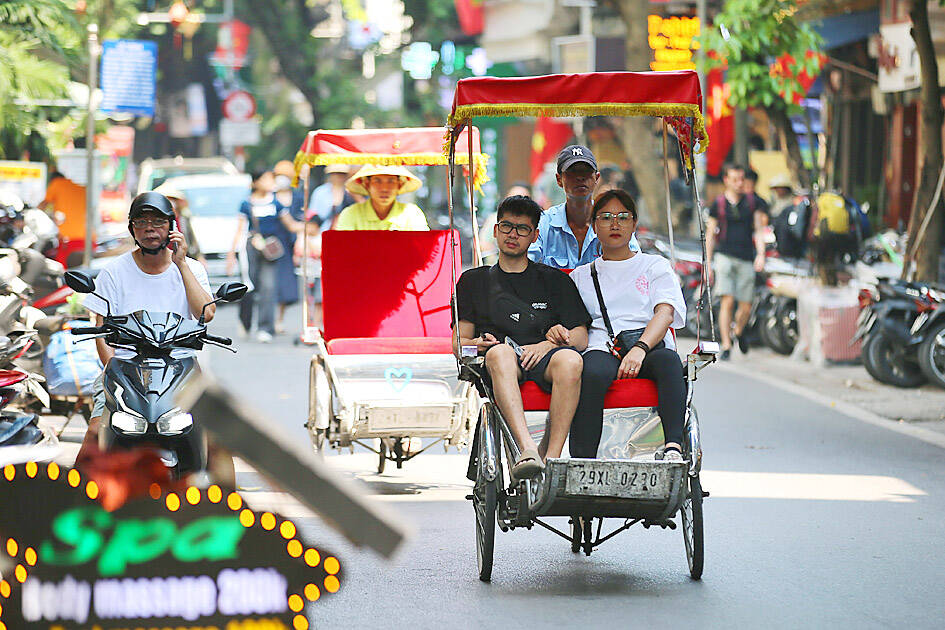Vietnam’s economic growth unexpectedly accelerated last quarter, buoyed by manufacturing and exports before a super typhoon last month caused widespread damage and prompted warnings of a challenging end to the year.
GDP rose by 7.4 percent in the three months ended September from a year earlier, the General Statistics Office (GSO) of Vietnam said yesterday. That compares with a 6.1 percent median estimate in a Bloomberg survey and a revised 7.09 percent expansion for the second quarter.
Vietnam’s economy has shown resilience this year as investment pours in, with Vietnamese Prime Minister Pham Minh Chinh vowing to cut logistical costs and improve infrastructure.

Photo:EPA-EFE
The government has sought to pull in capital from foreign tech giants such as Samsung Electronics Co and Intel Corp as the country emerges as a viable alternative to China in the production of electronics, from smartphones to basic semiconductors.
Investment and industry, especially manufacturing, were among “the driving forces for growth” in the third quarter this year, the GSO said.
Big gains in agriculture and other sectors in July and August helped limit the effect of serious damage to crop output from Super Typhoon Yagi last month, GSO head Nguyen Thi Huong said.
Yagi battered Vietnam’s northern provinces, killing hundreds and wreaking economic damage that is estimated at more than US$3 billion. Factory activity in the trade-reliant economy contracted for the first time in five months last month, reflecting the severity of the storm, according to an S&P Global purchasing managers’ index report.
The government’s latest GDP growth target of 6.8 percent to 7 percent for this year would be “a big challenge” as the impact of Yagi, geopolitical tensions and global economic concerns weigh on expansion, Huong said at a briefing in Hanoi.
Authorities earlier predicted a hit of 0.15 percentage points to this year’s growth.
The State Bank of Vietnam might “turn more dovish” by lowering interbank interest rates to aid the economy after Yagi, Mitsubishi UFJ Financial Group Inc said.
The IMF expects Vietnam to grow 6.1 percent this year, slightly faster than its previous estimate, supported by “continued strong external demand, resilient foreign direct investment and accommodative policies,” it said on Sept. 27.

BIG BUCKS: Chairman Wei is expected to receive NT$34.12 million on a proposed NT$5 cash dividend plan, while the National Development Fund would get NT$8.27 billion Taiwan Semiconductor Manufacturing Co (TSMC, 台積電), the world’s largest contract chipmaker, yesterday announced that its board of directors approved US$15.25 billion in capital appropriations for long-term expansion to meet growing demand. The funds are to be used for installing advanced technology and packaging capacity, expanding mature and specialty technology, and constructing fabs with facility systems, TSMC said in a statement. The board also approved a proposal to distribute a NT$5 cash dividend per share, based on first-quarter earnings per share of NT$13.94, it said. That surpasses the NT$4.50 dividend for the fourth quarter of last year. TSMC has said that while it is eager

‘IMMENSE SWAY’: The top 50 companies, based on market cap, shape everything from technology to consumer trends, advisory firm Visual Capitalist said Taiwan Semiconductor Manufacturing Co (TSMC, 台積電) was ranked the 10th-most valuable company globally this year, market information advisory firm Visual Capitalist said. TSMC sat on a market cap of about US$915 billion as of Monday last week, making it the 10th-most valuable company in the world and No. 1 in Asia, the publisher said in its “50 Most Valuable Companies in the World” list. Visual Capitalist described TSMC as the world’s largest dedicated semiconductor foundry operator that rolls out chips for major tech names such as US consumer electronics brand Apple Inc, and artificial intelligence (AI) chip designers Nvidia Corp and Advanced

Saudi Arabian Oil Co (Aramco), the Saudi state-owned oil giant, yesterday posted first-quarter profits of US$26 billion, down 4.6 percent from the prior year as falling global oil prices undermine the kingdom’s multitrillion-dollar development plans. Aramco had revenues of US$108.1 billion over the quarter, the company reported in a filing on Riyadh’s Tadawul stock exchange. The company saw US$107.2 billion in revenues and profits of US$27.2 billion for the same period last year. Saudi Arabia has promised to invest US$600 billion in the US over the course of US President Donald Trump’s second term. Trump, who is set to touch

SKEPTICAL: An economist said it is possible US and Chinese officials would walk away from the meeting saying talks were productive, without reducing tariffs at all US President Donald Trump hailed a “total reset” in US-China trade relations, ahead of a second day of talks yesterday between top officials from Washington and Beijing aimed at de-escalating trade tensions sparked by his aggressive tariff rollout. In a Truth Social post early yesterday, Trump praised the “very good” discussions and deemed them “a total reset negotiated in a friendly, but constructive, manner.” The second day of closed-door meetings between US Secretary of the Treasury Scott Bessent, US Trade Representative Jamieson Greer and Chinese Vice Premier He Lifeng (何立峰) were due to restart yesterday morning, said a person familiar